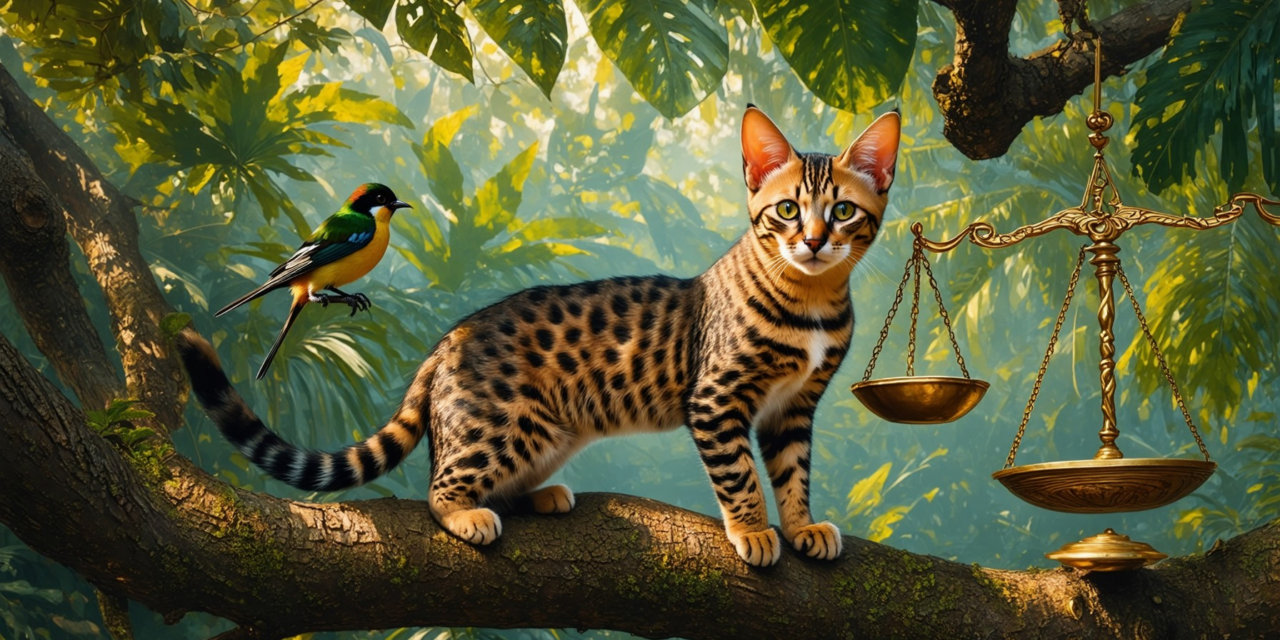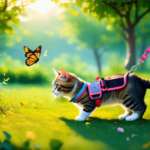Key Takeaways
- Understanding Serval Cats: Serval cats are wild animals with specific needs, making them unsuitable for most households.
- Wild Instincts: Their strong hunting drive and territorial behavior can lead to destructive actions and safety risks.
- Long-Term Commitment: Owning a serval involves a 20-25 year commitment and significant ongoing costs, including specialized food and veterinary care.
- Training Challenges: Servals are difficult to train and may require experienced exotic pet owners to manage their behaviors effectively.
- Legal Considerations: Regulations for owning servals vary by state, with some states allowing ownership without a license while others have strict bans.
- Hybrid Alternatives: Savannah cats, a hybrid of servals and domestic cats, offer a more domesticated option with fewer challenges for pet owners.
Are you considering adding a unique and exotic pet to your family? If so, you might be wondering, is a serval cat the right pet for you? In this article, we will delve into the fascinating world of serval cats, exploring their characteristics, behavior, and the various factors that influence their suitability as pets. From understanding whether serval cats are good pets to examining the legalities of ownership in the US, we will provide comprehensive insights into the pros and cons of owning a serval. Additionally, we will compare serval cats with their hybrid counterparts, the savannah cats, and discuss the costs associated with bringing a serval into your home. Whether you’re curious about their diet, lifespan, or the differences between serval and savannah breeds, this article will equip you with the knowledge you need to make an informed decision. Join us as we explore the captivating world of several cat options and help you determine if a serval cat is the perfect fit for your lifestyle.
Are serval cats good pets?
Serval cats, while captivating and beautiful, are not ideal pets for most households due to their wild nature and specific needs. Here are key considerations:
- Wild Instincts: Servals are inherently wild felines with a strong hunting drive and territorial behaviors. This can lead to destructive actions, such as scratching furniture or marking territory through urine spraying. Their instinctual behaviors can be challenging to manage in a domestic setting.
- Specialized Needs: Servals require a diet that mimics their natural prey, consisting of whole animals like rodents and birds. This diet can be both difficult to source and expensive, making it a significant commitment for potential owners. Additionally, they need a large, secure outdoor enclosure to accommodate their exercise and exploration needs.
- Safety Risks: Their wild instincts can pose safety risks, particularly for children or other pets in the household. Servals may not be suitable for families with young kids or smaller animals due to their predatory nature.
- Long Lifespan: With a lifespan of 20-25 years, adopting a serval is a long-term commitment. Prospective owners must be prepared for the responsibilities that come with caring for a pet for such an extended period.
- Training Challenges: Servals are not easily trained or socialized like domestic cats. Their independent nature can make them difficult to manage, requiring owners to have experience with exotic pets.
- Health Considerations: Servals are susceptible to certain diseases that can also affect humans, necessitating specialized veterinary care. Finding a veterinarian experienced with exotic animals can be a challenge and may incur additional costs.
- Financial Commitment: The overall cost of maintaining a serval, including specialized food, veterinary care, and a proper enclosure, can be substantial. Potential owners should be prepared for these ongoing expenses.
In summary, while serval cats can be fascinating creatures, they are best suited for experienced exotic pet owners who can meet their complex needs and provide a safe environment. For those considering a pet, it may be beneficial to explore domestic cat breeds that offer companionship without the challenges associated with wild instincts.
Comparison of serval cats and savannah cats
When considering serval cats as pets, it’s essential to compare them with savannah cats, which are hybrids of servals and domestic cats. Here are some key differences:
- Temperament: Savannah cats tend to have a more domesticated temperament, making them more suitable for family environments. They are generally more social and trainable compared to servals, which retain more of their wild instincts.
- Size: Serval cats are larger, typically weighing between 20-40 pounds, while savannah cats vary in size depending on their generation but usually weigh between 8-25 pounds. This size difference can impact the space and care requirements for each type of cat.
- Cost: The cost of a serval cat can be significantly higher than that of a savannah cat. Serval prices can range from $4,000 to $10,000 or more, while savannah cats generally range from $1,000 to $5,000 depending on their generation and breeder.
- Legal Considerations: Owning a serval may be subject to stricter regulations in many areas compared to savannah cats, which are often more widely accepted as pets.
In conclusion, while both serval cats and savannah cats have their unique appeal, savannah cats may be a more practical choice for those seeking a pet with a blend of exotic appearance and domesticated behavior.

Is Serval Cat Aggressive?
Understanding serval behavior and temperament is crucial for anyone considering a serval cat as a pet. Serval cats (Leptailurus serval) are medium-sized wild cats native to Africa, known for their striking appearance and unique behaviors. When considering whether serval cats are aggressive, it is essential to understand their nature and socialization.
Understanding Serval Behavior and Temperament
Serval cats can form strong bonds with their owners, leading to affectionate behavior. They are generally not aggressive towards humans, especially if they have been socialized from a young age. However, they retain their wild instincts, which can influence their behavior. As natural predators, servals exhibit hunting behaviors that can be perceived as aggressive. They are skilled hunters, primarily preying on small mammals, birds, and rodents. This predatory nature means they may display aggression towards smaller animals, particularly in a home environment where they might see pets as potential prey.
Additionally, serval cats can be territorial, especially males. They may show aggression towards other cats or animals that encroach on their territory. This behavior is typical in many wild cat species and is a natural instinct to protect their space. The level of aggression in serval cats can be significantly influenced by their environment and socialization. Providing a stimulating environment with plenty of enrichment can help mitigate aggressive tendencies. Engaging in activities that mimic their natural behaviors, such as climbing and hunting simulations, can also promote a healthier demeanor.
For those considering a serval cat as a pet, it is crucial to seek guidance from wildlife experts or veterinarians experienced with exotic animals. Understanding their needs and behaviors can lead to a more harmonious relationship. For more information on exotic pet care and behavior, resources such as the ASPCA provide valuable insights.
Factors Influencing Aggression in Serval Cats
Several factors can influence the aggression levels in serval cats. First, the socialization process is vital; servals that are well-socialized from a young age tend to be more adaptable and less aggressive. Second, their environment plays a significant role. A stimulating environment that allows for natural behaviors can reduce stress and aggression. Third, individual temperament varies; some serval cats may naturally be more docile, while others may exhibit more aggressive tendencies.
Moreover, the presence of other pets can trigger aggressive behavior, especially if the serval perceives them as competition or prey. It is essential to monitor interactions between servals and other animals closely. Lastly, health issues can also lead to changes in behavior, including increased aggression. Regular veterinary check-ups are crucial to ensure the well-being of your serval cat.
In conclusion, while serval cats are not inherently aggressive towards humans, their wild instincts and predatory nature can lead to aggressive behaviors towards smaller animals. Proper socialization, environmental enrichment, and professional guidance are key to managing their behavior effectively. For more insights on pet care, consider exploring articles on cat care tips and playful cat breeds.
Can You Own a Serval in the US?
Yes, you can own a serval in the US, but it is subject to various regulations that differ by state. Here’s a detailed overview:
Legal Considerations for Owning a Serval Cat
- State-Specific Laws: Some states, including South Carolina, North Carolina, West Virginia, Alabama, Nevada, Wisconsin, and Idaho, allow serval ownership without requiring a license. Conversely, states like California, New York, and New Jersey have strict regulations or outright bans on owning servals.
- Permits and Licenses: In states where serval ownership is permitted, some may require specific permits or licenses. It is crucial to check local wildlife laws and regulations to ensure compliance.
States Where Serval Ownership is Permitted
Understanding the legal landscape is essential for potential serval owners. Here are some states where owning a serval is allowed:
- South Carolina: No license required.
- North Carolina: No license required.
- West Virginia: No license required.
- Alabama: No license required.
- Nevada: No license required.
- Wisconsin: No license required.
- Idaho: No license required.
In contrast, states like California, New York, and New Jersey have strict regulations or outright bans on owning servals. Always consult local regulations and wildlife experts before making a decision.
Is a serval a threat to humans?
When considering the safety of serval cats (Leptailurus serval) as pets, it’s essential to assess the risks associated with their behavior and interactions with humans. Generally, servals are not considered a threat to humans. These wild cats are known for their elusive nature and typically avoid human contact. While they possess strong hunting instincts and can exhibit territorial behaviors, they are not aggressive towards people unless provoked.
Assessing the risks of serval cats as pets
Understanding the behavior of servals is crucial for potential owners. Here are some key characteristics that highlight their interactions with humans:
- Hunting Instincts: Servals are skilled hunters, primarily preying on small mammals, birds, and insects. Their remarkable ability to leap high into the air allows them to catch birds in flight.
- Territorial Behavior: Servals establish territories that they mark with scent. This behavior is crucial for their survival in the wild, as it helps them avoid conflicts with other servals.
- Social Structure: While generally solitary, servals may interact during mating season or when a mother is raising her kittens. Understanding this social dynamic is important for those considering a serval as a pet.
It is important to note that servals are not suitable as household pets due to their wild nature and specific environmental needs. They thrive in natural habitats such as savannas and wetlands, where they can exhibit their natural behaviors.
Myths vs. reality: servals and human safety
Many myths surround the idea of owning a serval cat. Some people believe that these exotic pets can be tamed like domestic cats, but this is far from the truth. Servals retain their wild instincts, making them unpredictable in a home environment. For those interested in understanding animal behavior and enhancing their interactions with wildlife, resources such as the ASPCA and the World Wildlife Fund provide valuable insights into responsible wildlife interactions and conservation efforts.
In summary, while servals are wild animals with unique behaviors, they do not pose a threat to humans under normal circumstances. Understanding their nature can foster a greater appreciation for these fascinating creatures and promote coexistence.

Can servals mate with house cats?
Yes, servals can mate with house cats, resulting in hybrid offspring known as Savannah cats. The Savannah cat is a breed developed from the crossbreeding of a serval (Leptailurus serval) and a domestic cat (Felis catus). This hybridization process typically produces large, lean cats that inherit distinctive features from both parent species, such as the serval’s prominent large ears and striking brown-spotted coats.
The biology of serval and domestic cat mating
The mating of servals and domestic cats is a fascinating process that combines the traits of both species. The first generation of these hybrids, known as F1 Savannahs, is particularly sought after due to their exotic appearance and unique temperament. Subsequent generations (F2, F3, etc.) continue to exhibit traits from both the serval and domestic cat, but with varying degrees of wild characteristics. The breeding of servals with domestic cats is regulated in many areas due to concerns about animal welfare and the implications of owning hybrid animals.
Understanding savannah cat breeds and hybrids
Savannah cats are known for their playful and energetic nature, often requiring more space and stimulation than typical domestic cats. They thrive in environments where they can engage in physical activities and mental challenges. For those considering a Savannah cat, it’s essential to understand their needs and ensure they are provided with a suitable living environment. Resources such as the The Cat API and reputable breeders can provide valuable information on the care and characteristics of Savannah cats and their hybrid lineage.
Has a serval cat ever attacked a human?
Instances of serval cats attacking humans are indeed rare, but they have been documented in certain circumstances. Servals (Leptailurus serval) are medium-sized wild cats native to Africa, known for their agility and hunting prowess. While they are generally not aggressive towards humans, there are a few factors that can lead to an attack:
- Territorial Behavior: Servals are territorial animals. If a human inadvertently enters their territory, especially during mating season, the serval may feel threatened and react defensively.
- Stress or Fear: Like many wild animals, servals can become stressed or frightened, particularly if they feel cornered or are protecting their young. In such situations, they may lash out.
- Domestication and Interaction: Some servals are kept as exotic pets. In these cases, improper handling or lack of socialization can lead to aggressive behavior towards humans. It is crucial for owners to understand the wild nature of these animals and provide appropriate care and training.
- Human Encroachment: As human populations expand into serval habitats, encounters become more likely. In areas where servals are forced into closer proximity with humans, the potential for conflict increases.
While there are anecdotal reports of servals attacking humans, these incidents are not common and often involve specific triggers. According to the International Society for Animal Rights, the best approach to minimize risks is to respect wildlife and maintain a safe distance.
Documented incidents involving serval cats
Documented incidents of serval cats attacking humans are few and far between. Most reports arise from situations where the serval felt threatened or was improperly handled as a pet. For instance, there have been cases where servals kept in captivity exhibited aggressive behavior due to inadequate socialization or stress. Understanding the natural instincts of servals is crucial for anyone considering a serval as a pet. Resources such as the ASPCA provide guidance on the responsibilities of owning exotic pets.
Safety measures for serval cat owners
For those who own serval cats as pets, implementing safety measures is essential to ensure both human and animal well-being. Here are some key practices:
- Proper Socialization: Early and consistent socialization can help reduce fear and aggression in serval cats. Engaging them with various environments and people can foster a more balanced temperament.
- Secure Enclosures: Providing a secure and spacious environment is vital. Servals are active and curious, so a well-constructed enclosure can prevent escape and reduce stress.
- Understanding Body Language: Learning to read a serval’s body language can help owners identify signs of stress or discomfort, allowing for timely intervention.
- Regular Veterinary Care: Routine check-ups with a veterinarian experienced in exotic animals can help monitor the health and behavior of servals, ensuring they remain well-adjusted.
By following these safety measures, serval cat owners can create a harmonious living environment that respects the wild nature of these fascinating animals. For more information on caring for exotic pets, consider visiting Vetstreet.
Serval Cat Price and Costs
When considering a serval cat as a pet, understanding the serval cat price and associated costs is crucial. The initial purchase price of a serval cat can vary significantly based on factors such as the breeder’s reputation, the cat’s lineage, and whether it is a purebred or a hybrid. On average, the cost of a serval cat ranges from $1,500 to $4,000, with some exceptional cases reaching upwards of $10,000 for high-quality specimens. This price reflects the rarity and exotic nature of the african serval.
Breakdown of Serval Cat Price and Costs
In addition to the initial purchase price, potential serval owners should consider ongoing costs that contribute to the overall expense of owning a serval pet. Here’s a breakdown of typical costs:
- Food: Servals require a high-protein diet, often consisting of raw meat, which can cost between $100 to $300 per month.
- Veterinary Care: Regular check-ups, vaccinations, and potential health issues can lead to annual veterinary expenses of $500 to $1,000.
- Enclosure: A secure outdoor enclosure is essential for a serval, costing anywhere from $1,000 to $5,000 depending on size and materials.
- Insurance: Pet insurance for exotic animals can range from $30 to $100 per month, depending on coverage.
Overall, the serval cats cost can add up quickly, making it essential for prospective owners to budget accordingly.
Factors Affecting the Cost of Serval Cats and Savannah Cats
Several factors influence the price of serval cats and their hybrids, such as savannah cats. Key considerations include:
- Breeder Reputation: Well-established breeders with a history of healthy, well-socialized cats typically charge more.
- Hybrid Generation: The savannah cat is a hybrid of a serval and a domestic cat, with F1 hybrids (first generation) being more expensive than later generations due to their closer lineage to the serval.
- Location: Prices can vary by region, with some areas having stricter regulations that can affect availability and cost.
- Health Testing: Breeders who conduct health screenings and genetic testing may charge higher prices to ensure the health of their kittens.
Understanding these factors can help potential owners make informed decisions when considering a serval cat as a pet or exploring options for several cat for sale.













